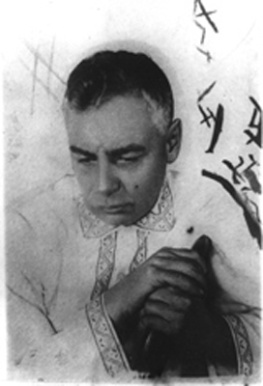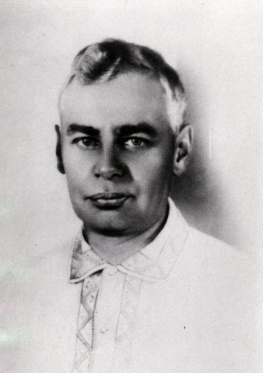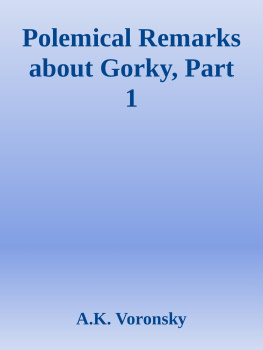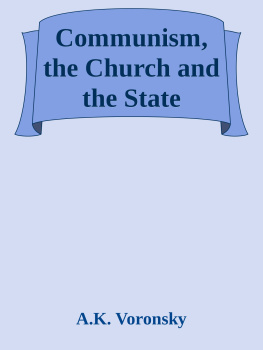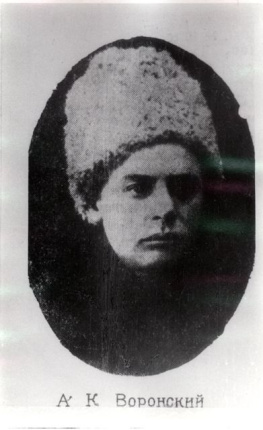A.K. Voronsky - On Art
Here you can read online A.K. Voronsky - On Art full text of the book (entire story) in english for free. Download pdf and epub, get meaning, cover and reviews about this ebook. genre: Science. Description of the work, (preface) as well as reviews are available. Best literature library LitArk.com created for fans of good reading and offers a wide selection of genres:
Romance novel
Science fiction
Adventure
Detective
Science
History
Home and family
Prose
Art
Politics
Computer
Non-fiction
Religion
Business
Children
Humor
Choose a favorite category and find really read worthwhile books. Enjoy immersion in the world of imagination, feel the emotions of the characters or learn something new for yourself, make an fascinating discovery.
- Book:On Art
- Author:
- Genre:
- Rating:4 / 5
- Favourites:Add to favourites
- Your mark:
- 80
- 1
- 2
- 3
- 4
- 5
On Art: summary, description and annotation
We offer to read an annotation, description, summary or preface (depends on what the author of the book "On Art" wrote himself). If you haven't found the necessary information about the book — write in the comments, we will try to find it.
On Art — read online for free the complete book (whole text) full work
Below is the text of the book, divided by pages. System saving the place of the last page read, allows you to conveniently read the book "On Art" online for free, without having to search again every time where you left off. Put a bookmark, and you can go to the page where you finished reading at any time.
Font size:
Interval:
Bookmark:
This is the first of Voronsky's more theoretical articles dealing with psychological aspects of the creative process, a theme to which he would often turn toward the end of the 1920s. By placing such emphasis on intuition, Voronsky would be accused, incorrectly, of "Bergsonism."
This is also the first article in which Voronsky devotes so much attention to Tolstoy's genius as a writer. He would return to this theme as well in subsequent articles.
Perhaps it would be timely to recall, especially for the younger post October generation, one famous scene recorded by L. N. Tolstoy in Anna Karenina. This scene deals with the process of artistic creativity and is extremely important given today's literary chaos and discordance, when homespun critical concoctions and fabrications are passed off as Marxist revelations. Sometimes it is very useful to repeat what one has learned thoroughly at an earlier time.
We are speaking of the passage in the novel where Vronsky and Anna Karenina make the acquaintance of the artist Mikhailov. The few pages devoted to this meeting are filled with meaning, simplicity and artistic truth, and delve into the secret recesses of artistic creativity. Tolstoy writes:
He [Mikhailov - A.K.V.] was sketching the figure of a man in a fit of anger. He had sketched him before, but had been dissatisfied with the result. "No, the other one was better.... Where is it?" He went back to his wife, and frowning, without looking at her, asked his eldest little girl where the paper was that he had given them. The paper with the drawing that he had thrown away was found, but it was dirty now and spotted with candle grease. Nevertheless, he took it, put it on his table, and, stepping backward and screwing up his eyes, began examining it. Suddenly he smiled and flung up his arms joyfully.
"That's it! That's it!" he said, and taking up his pencil he began drawing rapidly. A grease spot had given the figure a new pose.
He copied that new pose, and, suddenly remembering the energetic pose and prominent chin of a shopman from whom he had bought cigars, he gave the figure that man's face and chin. He laughed with joy, for the inanimate, unnatural figure had become alive, and was just the thing. The figure was alive, clear, and well defined. It was possible to correct the drawing to accord with the requirements of the pose; it was possible and even necessary to place the feet further apart, to alter the position of the left arm, and to throw back the hair. But while making the corrections he did not alter the pose but only removed what interfered with its character. He removed, if one may say so, the coverings which partially obscured the figure, every fresh stroke making its energy and power more apparent and more as it had been suddenly revealed to him by the effects of the grease spot.
Let us set aside for the time being what L. N. Tolstoy writes about removing the coverings, and focus on another aspect. In our times the writers and critics from the so-called Left Front (LEF, "Gorn," and here we must include the Formalists) are waging a rather energetic literary campaign against interpreting art as a creative act. "Creation," "intuition," and "inspiration" are greeted with derision; some consider these concepts bourgeois or aristocratic, others feel that they are unscientific. They try to replace them with "work," "mastery," "craftsmanship," "energetic word-formation," "device," "technique" or "the making of things." These and other like attempts clearly contradict, however, the facts which have been established both by psychologists and artists. They are also contradicted by what L. N. Tolstoy writes about Mikhailov. Indeed, the artist is several times "suddenly" struck by something; the grease spot suddenly gave the figure a new and necessary pose, the new pose suddenly helped him recall the chin of a merchant which proved to be more than appropriate, and finally, Mikhailov suddenly firmly understood that the figure was "well defined." Intuition, inspiration, creativity or feeling are the names we give to opinions, truths, or the sum of notions and ideas of which we are certain, without being assisted by conscious, analytical thought. In intuition, necessary ideas and opinions are formed in the sphere of the unconscious. They erupt onto the surface of consciousness suddenly, immediately and unexpectedly. They are not the simple play of feelings and imagination. We know, we feel, or we sense that it is so, but this (intuitive) knowledge is not achieved through logic. If such is the nature of intuition, and it is, then in L. N. Tolstoy's story about Mikhailov's creativity we have the most typical example of artistic intuition. We are particularly convinced by the fact that the artist suddenly felt, sensed and inwardly understood that the figure was well defined. The artist can then think through and logically explain why the figure "defined itself," or he can turn out not to be able to do this; but primarily, and most fundamentally, this "suddenly" is decisive. It guides the artist, it puts an end to searches and hesitation, and the artist then begins to work firmly, quickly and confidently.
The process of creativity is far from a somnambulistic state; it remains fully rooted "in common sense and memory." Later L. N. Tolstoy stresses that Mikhailov "couldn't work when he was cold," or when he was "too agitated," or when "he saw things too well"; the peculiarity of creativity lies only in the fact that it doesn't proceed in the usual way that logical reflections do.
In intuition there is nothing divine or metempirical. An artist's intuition begins its work much earlier, with the perception and gathering of material. In describing the meeting between Vronsky, Anna and Golenishchev with Mikhailov in the artist's studio, Tolstoy writes:
With rapid steps he approached the door of his studio, and in spite of his excitement was struck by the soft light on Anna's figure as she stood in the shadow of the porch listening to something Golenishchev was vehemently saying, and at the same time evidently wishing to look at the approaching artist. He was himself unconscious that as he approached them he seized and absorbed this impression, just as he had retained the tobacconist's chin and hidden it away where he could find it when it was wanted.
... Although his artistic perceptions never slept, and although he was growing more and more excited as the moment approached when his picture was to be criticized, he quickly and shrewdly, from imperceptible data, formed his opinion of these three persons.
Mikhailov's consciousness was occupied with the thought of how the visitors would evaluate his painting, but his artistic sense, quite apart from consciousness and unnoticed by the artist himself, gathered and perceived material. This process occurred intuitively. In doing this, Mikhailov did not gather material indiscriminately. He secreted away in his closet less than everything. He unconsciously absorbed things, but at the same time chose only those things which might be useful. He noted Anna's soft light, and with Vronsky he noted the cheekbones, in particular; he also recorded Golenishchev, "but," notes Tolstoy, "he also remembered that this was one of the faces he had mentally put aside with the enormous class of falsely important faces, faces lacking expression."4
Of course, while unconsciously making such a selection, the artist was doing what is characteristic of every mortal being. We often choose unconsciously, without selecting everything.
Man's ideas about the world develop from impressions received from the external world and reworked in accordance with the frame of mind and character of the given person. He perceives only what attracts his attention, and his attention is determined by interests dependent on his class milieu. The peculiarity of the artist lies only in the fact that he unconsciously separates out and notices only the typical; and this typical is not abstract, but concrete. It is an object and exists in the form of images.
Font size:
Interval:
Bookmark:
Similar books «On Art»
Look at similar books to On Art. We have selected literature similar in name and meaning in the hope of providing readers with more options to find new, interesting, not yet read works.
Discussion, reviews of the book On Art and just readers' own opinions. Leave your comments, write what you think about the work, its meaning or the main characters. Specify what exactly you liked and what you didn't like, and why you think so.

